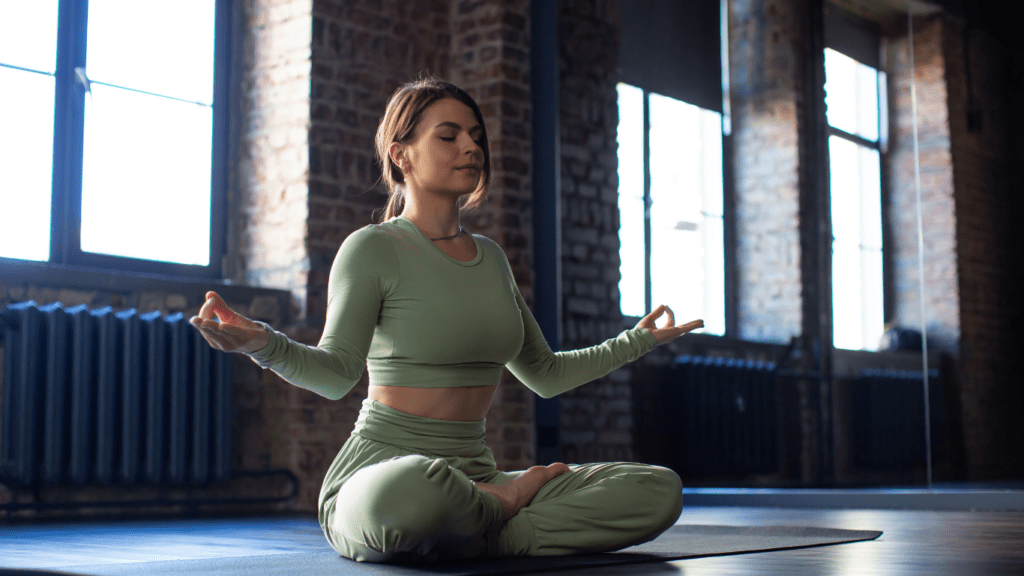Understanding Stress and Its Impact
Stress is a natural response to challenging situations. Our bodies release hormones like cortisol and adrenaline to manage stressors. This fight-or-flight response can help in short-term scenarios but becomes harmful with prolonged exposure.
Continuous stress affects physical and mental health. High stress levels lead to issues like:
- hypertension
- sleep disorders
- weakened immune system,
- anxiety
- depression
These effects reduce the quality of life and hinder daily functioning.
Chronic stress also impairs cognitive functions. Memory problems, difficulty concentrating, and impaired judgment become common. Work performance and personal relationships deteriorate due to the inability to focus and emotional instability.
Understanding these impacts shows the necessity of stress relief practices. Meditation serves as an effective method to manage and reduce stress by promoting relaxation and mental clarity. Practicing meditation breaks the stress cycle and fosters a balanced, healthier life.
The Benefits of Meditation for Stress Relief
Meditation offers various benefits for stress relief, enhancing both mental and physical well-being. It helps decrease cortisol levels, the hormone responsible for stress, thereby reducing the physiological impact of stress on the body. Lower cortisol levels can lead to better sleep, improved digestion, and enhanced immune function. Studies show that regular meditation can lower blood pressure and reduce symptoms of anxiety and depression.
Meditation promotes mental clarity and focus. By practicing mindfulness, individuals learn to live in the present moment, reducing the tendency to worry about the past or future. This shift in perspective can significantly reduce feelings of overwhelm and improve overall emotional health. Meditation fosters emotional resilience, helping individuals respond to stressors more calmly and effectively.
Research also indicates that meditation enhances brain function. Consistent practice is shown to increase the gray matter in areas of the brain associated with memory, learning, and self-awareness. These changes in the brain can lead to improved cognitive function, better decision-making, and enhanced problem-solving skills, which are crucial for managing stress.
Additionally, meditation encourages a more profound sense of connection with oneself and others. This sense of connection can nurture feelings of compassion and empathy, improving personal relationships. Healthier relationships contribute to a supportive environment, which is essential for stress management.
Meditation also supports physical relaxation. Techniques such as deep breathing, progressive muscle relaxation, and guided visualization help release tension from the body. Physical relaxation complements mental calmness, creating a holistic approach to stress relief and well-being.
Popular Meditation Techniques

Meditation helps manage stress effectively. Here are popular techniques that make stress relief possible.
Mindfulness Meditation
Mindfulness Meditation focuses on being present. Practitioners pay attention to their thoughts, emotions, and sensations without judgment. This practice improves awareness and emotional regulation. For example, individuals observe their breath or bodily sensations in a seated position. Research indicates Mindfulness Meditation reduces anxiety and depression.
Transcendental Meditation
Transcendental Meditation uses a mantra. By silently repeating a specific word or sound, practitioners experience deep relaxation and transcend thought. Typically practiced twice daily for 20 minutes, this technique significantly lowers cortisol levels and blood pressure. Studies show improved psychological well-being in those who practice Transcendental Meditation regularly.
Guided Meditation
Guided Meditation involves listening to a narrator. Individuals follow verbal instructions, often including visualization exercises. This technique helps create mental imagery aligned with relaxation, peace, and healing. Popular apps and audio recordings offer guided sessions lasting from five minutes to an hour. Research shows lower stress and enhanced mental clarity in participants.
Loving-Kindness Meditation
Loving-Kindness Meditation promotes compassion. Practitioners focus on generating warm, friendly feelings toward self and others. Often, they repeat phrases wishing happiness and wellness for themselves and loved ones. This method strengthens social connections and boosts emotional resilience. Evidence supports reduced emotional stress and increased positive emotions.
Body Scan Meditation
Body Scan Meditation involves scanning the body for tension. Practitioners mentally check different body parts from head to toe, noticing sensations and releasing tension deliberately. This technique enhances body awareness and physical relaxation. Sessions typically last 30-45 minutes. Studies highlight benefits like reduced chronic pain and better sleep quality.
How to Choose the Right Technique for You
Choosing the right meditation technique can enhance your stress relief journey. Everyone’s needs and circumstances vary, so finding a method that fits your lifestyle and stress levels is crucial.
Assessing Your Stress Levels
Evaluating your stress levels helps tailor the meditation technique to your needs. High-stress levels might benefit from longer, deeper meditative practices like Transcendental Meditation. Moderate stress can be managed with Mindfulness Meditation, focusing on present-moment awareness. Low-stress levels might find short, guided sessions beneficial.
Considering Your Lifestyle and Preferences
- Aligning the meditation technique with your lifestyle ensures consistency.
- Busy schedules might favor short sessions like Guided Meditation.
- Enjoying solitude could draw you to individual practices like Loving-Kindness Meditation.
- If tactile experiences appeal to you, Body Scan Meditation offers physical relaxation.
- Choose based on what integrates seamlessly into your daily routine.
- Selecting the right meditation technique can drastically improve stress management.
- Assess your stress levels and lifestyle preferences to find the most effective method.
Tips for Beginners
Starting with meditation can feel overwhelming, but with the right approach, it becomes easier and more effective.
Setting Up a Meditation Space
Choose a quiet spot free from distractions. Ensure the area is comfortable, whether it’s a corner of a room or a dedicated space. Use items like cushions or yoga mats to support a stable posture. Keeping the space clean and uncluttered can help maintain focus. Consider incorporating elements like candles or calming music to enhance the ambiance.
Creating a Consistent Routine
Consistency is key for meditation efficacy. Set a specific time each day for practice. Integrating meditation into morning or evening routines ensures regularity. Start with short sessions, like 5-10 minutes, and gradually increase the duration. Use reminders, such as alarms or calendar notifications, to maintain discipline.
Personal Experiences and Testimonials
Personal Story 1: Finding Calm Through Mindfulness
I’ve always been skeptical about meditation, but stress at work pushed me to try. I started with Mindfulness Meditation, focusing on my breath and staying present. Within two weeks, I noticed a significant decrease in anxiety and felt more grounded. The habit helped me control my stress levels, and I now meditate daily.
Personal Story 2: Relief Through Guided Meditation
When I was dealing with insomnia, someone suggested Guided Meditation. I found an app that offered calming sessions, and I dedicated 15 minutes each night to it. This routine improved my sleep patterns remarkably. The guided sessions provided structure, making it easy for beginners like me to follow along and benefit.
Personal Story 3: Healing with Loving-Kindness Meditation
After experiencing a difficult breakup, Loving-Kindness Meditation was a game-changer. By directing positive wishes toward myself and others, I cultivated compassion and reduced feelings of resentment. Practicing this technique helped me heal emotionally and foster better relationships.
Testimonial 1: Body Scan Meditation Reducing Physical Tension
A close friend shared how Body Scan Meditation transformed her approach to handling physical stress. She often felt tension in her shoulders and back, which impacted her daily life. Through consistent practice, she learned to identify and release this tension, resulting in better posture and reduced pain.
Testimonial 2: Transcendental Meditation for Overall Well-Being
Another colleague found solace in Transcendental Meditation. The simple act of repeating a mantra provided deep relaxation and mental clarity. She reported improved focus at work and a sense of inner peace that carried over into other aspects of her life. Her experience motivated others in our team to explore meditation.
 Laurae Parhamim is the founder of Top Wellness Activity Hub, a comprehensive platform dedicated to promoting holistic health and wellness. With a passion for well-being and a deep understanding of the latest trends in health practices, Laurae has crafted a space that serves as a go-to resource for individuals seeking to enhance their physical, mental, and emotional health. Under Laurae's leadership, the platform offers a wide array of content, from nutritious eating tips to the intricacies of yoga, Pilates, and meditation. The goal is to provide valuable insights and practical advice that empower individuals to lead healthier, more balanced lives.
Laurae's dedication to wellness stems from a belief in the transformative power of healthy habits and mindful practices. Recognizing the importance of accessible, reliable information, Laurae has also integrated gear reviews and updates on wellness trends to ensure users are well-equipped on their journey to well-being. This comprehensive approach reflects Laurae's commitment to creating a platform that caters to both beginners and seasoned wellness enthusiasts. As the visionary behind Top Wellness Activity Hub, Laurae continues to innovate, inspire, and guide others towards achieving their wellness goals.
Laurae Parhamim is the founder of Top Wellness Activity Hub, a comprehensive platform dedicated to promoting holistic health and wellness. With a passion for well-being and a deep understanding of the latest trends in health practices, Laurae has crafted a space that serves as a go-to resource for individuals seeking to enhance their physical, mental, and emotional health. Under Laurae's leadership, the platform offers a wide array of content, from nutritious eating tips to the intricacies of yoga, Pilates, and meditation. The goal is to provide valuable insights and practical advice that empower individuals to lead healthier, more balanced lives.
Laurae's dedication to wellness stems from a belief in the transformative power of healthy habits and mindful practices. Recognizing the importance of accessible, reliable information, Laurae has also integrated gear reviews and updates on wellness trends to ensure users are well-equipped on their journey to well-being. This comprehensive approach reflects Laurae's commitment to creating a platform that caters to both beginners and seasoned wellness enthusiasts. As the visionary behind Top Wellness Activity Hub, Laurae continues to innovate, inspire, and guide others towards achieving their wellness goals.